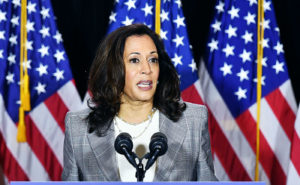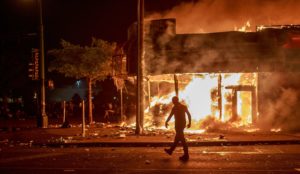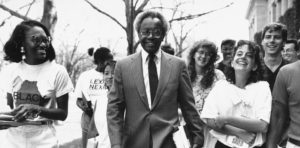Shortly after Glenn Youngkin was sworn in as governor of Virginia on Saturday, he issued a flurry of day-one executive orders. With those initial actions, the first Republican to win statewide in the Commonwealth since 2009 was true to the issues that delivered him victory.
The first two orders were aimed at the classroom. One promised “to ensure excellence” in schools by taking steps to “end the use of inherently divisive concepts, including Critical Race Theory, and to raise academic standards”. The other affirmed that whether or not a child should wear a mask to school was up to parents, not schools. Youngkin knows what was clear to anyone watching the Virginia gubernatorial race: that his focus on the question of who is in control of the state’s classrooms — whether they are open or not, and what is being taught when they are — was what delivered a Republican win in a state that voted for Joe Biden by 10 percentage points just a year earlier.
While many Virginians with school-age children were angered by long-term school closures during the pandemic, the promotion of a divisive “antiracist” pedagogy and the abandonment of the meritocratic pursuit of academic excellence, Youngkin’s opponent, Terry McAuliffe, sided with the teachers’ unions. Youngkin called his campaign events “parents matter” rallies, while McAuliffe chose Randi Weingarten — the union head honcho and public enemy number one for parents of children who, in many cases, missed more than a year’s worth of in-person schooling — as a headline speaker for his election-eve rally. In one debate, he uttered a self-incriminating mantra: “I don’t think parents should be telling schools what they should teach.” He never recovered.
Much of the debate that followed the Virginia result centered on whether it was school closures or the pedagogy for which Critical Race Theory has become a shorthand were the bigger factor. Some on the Left leapt on the fact that the anti-CRT campaigner Christopher Rufo is explicit about his intent to weaponise CRT against Democrats. An analysis of the Virginia results by Michael Hartney, a political scientist at Boston College, found that Youngkin did better in areas where school closures had been more extensive.
But this post-mortem fails to understand just how tangled the issues are. The anti-CRT backlash was a product of remote learning: parents saw what their children were learning and, in many cases, were not impressed. Anger at a progressive reckoning was understandably intensified by the timing: renaming schools, paying thousands of dollars for a Zoom lecture from Ibram X. Kendi and abolishing standardised testing at a time when classrooms were closed, grades were slipping and the poorest students with the least support were being hit the hardest. Taken together, these questions boil down to control: who decides what happens in America’s schools?
Needless to say, classroom issues are not limited to Virginia. And for many Republicans, Youngkin struck on a winning issue ahead of the midterms later this year. Party strategists hope they can win back a cohort of college-educated suburban voters they lost during the Trump years. Some panicked Democrats also appear to realize this: since November, parts of the party have dropped their previous passivity towards the teachers’ unions. But whether or not Democrats learn the right lessons from 2021, parents of school-age children have been identified as a crucial slice of the electorate. They are worried and frustrated. And they have mobilised. They have joined campaign groups, attended school-board meetings and run for office. And they are set to decide races across America.
Writing in The Atlantic recently, one parent explained how a broader disillusion with the Democratic Party was triggered by pandemic schooling: “until recently… [I was] a loyal, Left-leaning Democrat, and I had been my entire adult life. I was the kind of partisan who registered voters before midterm elections and went to protests. I hated Donald Trump so much that I struggled to be civil to relatives on the other side of the aisle. But because of what my family has gone through during the pandemic, I can’t muster the same enthusiasm. I feel adrift from my tribe and, to a certain degree, disgusted with both parties.”
Another parent, a progressive who lives in Northern Virginia, an affluent, heavily Democratic part of the country, explained to me his disgust at the support for closures from his political allies. “I’m a Left-winger and the people who were the most pro-closure were all on the Left,” he said. “Everything they were pushing for was antithetical to liberalism. School closures were hurting the most at-risk kids: people whose parents aren’t a lawyer like me… The hypocrisy of these people was incredible. They claimed to care so much about underprivileged people and yet were ready to throw them under the bus.”
He says he knows many lifetime Democrats who voted for Youngkin because they wanted schools to return to normal for their children.
If candidates and political consultants are plotting ways to win over the parent vote, education activists hope that the pandemic will prove to be a decisive moment for American schooling. “Covid didn’t break the public school system. It was already broken,” says Corey DeAngelis, the national director of research at School Choice Now. “But, for almost two years now, it has shone a spotlight on the main problem with K-12 education across America, which is a massive, long-existing power imbalance between the public school teachers’ union monopoly and families.”
Parents are voting with their feet. Enrolment in New York City’s public school system has dropped by 5% since the start of the pandemic. Homeschooling increased by 50% in Virginia in the 2020-21 school year. Nationwide, more than half a million American children have left public education since the start of the pandemic. The school-choice movement is flourishing. Public support is at an all-time high while 18 states have expanded school-choice measures. The number of states with an education saving account programme, which DeAngelis calls the “gold standard” for school choice and which allows parents to receive public funds for education if they withdraw their children from the public system, doubled from five to ten last year.
The question is whether anger over education at the moment will trigger a long-lasting change in education politics in America, or whether business as usual returns once anger over school closures subsides. I suspect it will do the former, just as the effects of the pandemic school closures will likely do lasting damage to the mental health and educational outcomes of America’s children.
Organisations started by parents to pressure their school systems offer a counterweight to teachers’ unions now have an institutional momentum of their own. Choice-enhancing policy changes will not be repealed overnight. Parents stuck dealing with at-home learning for more than a year will not easily forget who was revealed to have a veto power over their children’s education.
Perhaps above all else, the spread of anti-racist dogma in public education — and the prioritisation of progressive genuflecting over academic excellence — will mobilise all but the most progressive of parents.
Of the many hasty symbolic changes made during the racial reckoning of 2020, the one I keep returning to is the decision by KIPP, the country’s largest network of charter schools, to retire their national slogan, which, until the summer of 2020, was “Work hard. Be nice.” It isn’t just impossibly inoffensive, but it strikes me as a pretty good motto: who wouldn’t want their kids to live by those words? But according to KIPP, the four-word mantra needed to go because it “supports the illusion of meritocracy” and because “working hard and being nice is not going to dismantle systemic racism”.
After the pandemic passes, that toxic ideology will remain. It seems so anathema to human nature that a counter-revolution feels inevitable. In fact — as Virginia is demonstrating — it is already underway. And it is parents who are its foot-soldiers.
Disclaimer
Some of the posts we share are controversial and we do not necessarily agree with them in the whole extend. Sometimes we agree with the content or part of it but we do not agree with the narration or language. Nevertheless we find them somehow interesting, valuable and/or informative or we share them, because we strongly believe in freedom of speech, free press and journalism. We strongly encourage you to have a critical approach to all the content, do your own research and analysis to build your own opinion.
We would be glad to have your feedback.
Source: UnHerd Read the original article here: https://unherd.com




